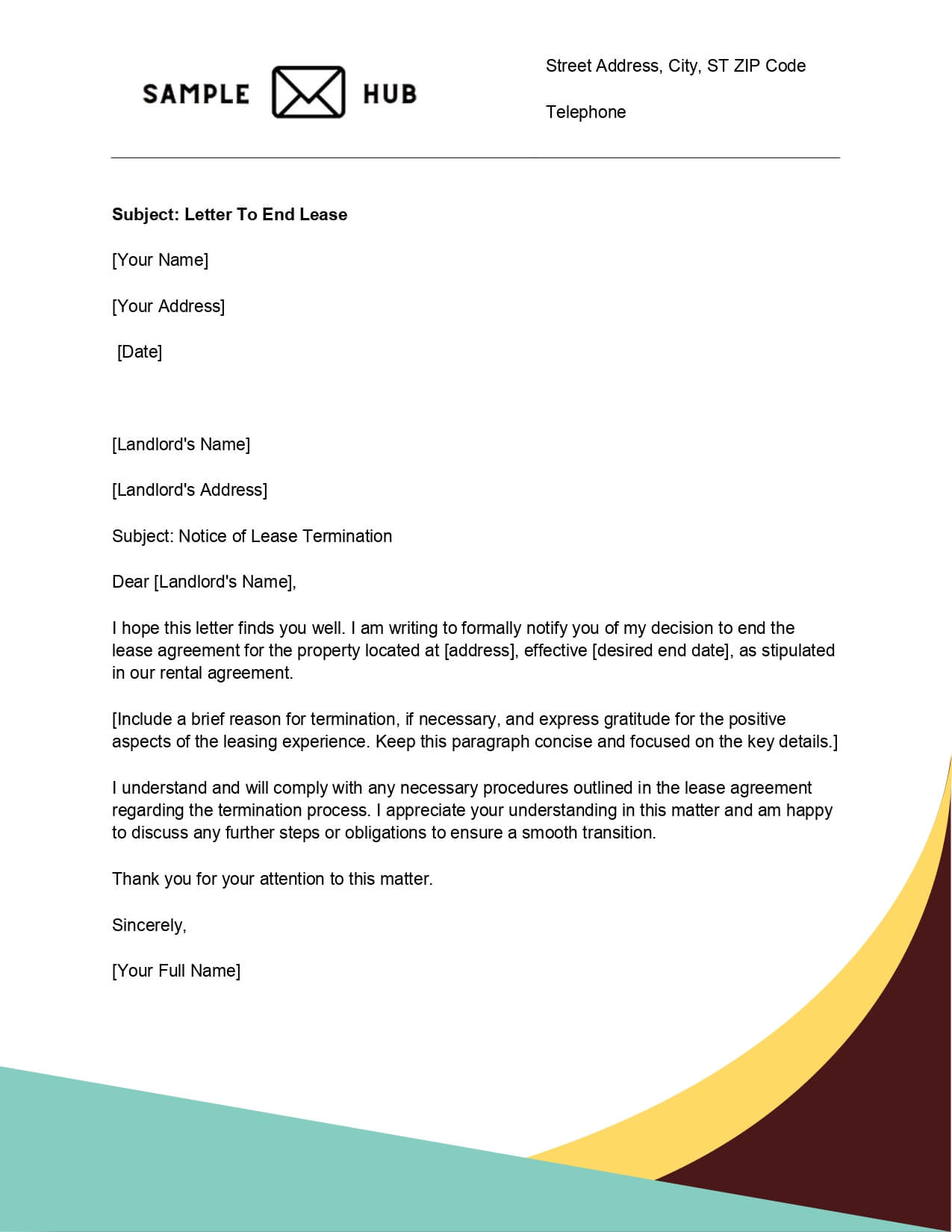Are you looking to end your lease agreement? A Letter to End Lease is a formal document that notifies your landlord or property manager of your intention to terminate your lease.
This letter is an essential step in the process of ending your lease agreement and should be written with care to ensure that you are following the terms of your lease agreement and local laws.
In this blog article, we will provide you with templates, examples, and samples of Letter to End Lease. Our goal is to make it easy for you to write a letter that meets your specific needs.
Whether you are ending your lease early or at the end of the lease term, we have a variety of templates that you can use as a starting point. We understand that writing a letter can be a daunting task, but with our help, you can ensure that your letter is professional, concise, and effective.
Our Letter to End Lease templates are designed to be user-friendly and customizable. We have included all the necessary information that you need to include in your letter, such as your name, address, and the date of termination.
We have also provided you with sample language that you can use to explain your reasons for ending your lease. With our templates, you can save time and ensure that your letter is written correctly.
Letter To End Lease
Dear [Landlord’s Full Name],
I trust this letter finds you well. I am writing to formally notify you that I intend to end my lease agreement for the property located at [Your Address]. After careful consideration, I have decided not to renew the lease, and I would like to provide the required notice as per our lease agreement.
According to the terms of our lease, I am obligated to provide [X weeks/months] notice before the intended termination date. Therefore, please consider this letter as [X weeks/months] notice, and I plan to vacate the premises on [End Date].
I will ensure that the property is returned in good condition, and I am open to coordinating a pre-move-out inspection at your convenience.
I appreciate your understanding in this matter and would like to express my gratitude for our positive landlord-tenant relationship throughout the lease period. If there are any specific procedures or requirements for the move-out process, please let me know, and I will comply accordingly.
Thank you for your attention to this matter. I look forward to completing the necessary steps to ensure a smooth transition.
Sincerely,
[Your Full Name]
Lease Termination Letter From Tenant
Dear [Landlord’s Full Name],
I trust this letter finds you well. I am writing to formally notify you that I have decided to terminate my lease agreement for the property located at [Your Address]. After careful consideration, I have determined that it is in my best interest to end the tenancy.
Per the terms of our lease agreement, I am providing [X weeks/months] notice, and my intended move-out date is [End Date]. I will ensure that the property is returned in good condition, and I am open to scheduling a pre-move-out inspection at your convenience.
I appreciate your understanding in this matter, and I am committed to fulfilling any obligations outlined in the lease agreement during the transition process. If there are specific procedures or requirements for the move-out, please inform me so that I can comply accordingly.
Thank you for your cooperation, and I hope this notice allows for a smooth and amicable termination of our lease agreement.
Sincerely,
[Your Full Name]
Lease Termination Letter To Landlord
Dear [Landlord’s Full Name],
I hope this letter finds you well. I am writing to officially notify you of my decision to terminate the lease agreement for the property located at [Your Address]. After careful consideration, I have determined that it is in my best interest to conclude the tenancy.
As per the terms outlined in our lease agreement, I am providing [X weeks/months] notice, and my intended move-out date is [End Date]. I will ensure that the property is returned in good condition and am willing to schedule a pre-move-out inspection at your earliest convenience.
I appreciate your understanding in this matter, and I am committed to fulfilling any obligations stipulated in the lease agreement during this transition period. If there are specific guidelines or procedures for the move-out process, please inform me so I can comply accordingly.
Thank you for your cooperation, and I trust that we can conclude this matter amicably.
Sincerely,
[Your Full Name]
Lease Termination Letter From Tenant To Landlord
Dear [Landlord’s Full Name],
I trust this letter finds you well. I am writing to formally notify you of my decision to terminate the lease agreement for the property located at [Your Address]. After careful consideration, I have determined that it is in my best interest to conclude the tenancy.
In accordance with the terms outlined in our lease agreement, I am providing [X weeks/months] notice, and my intended move-out date is [End Date]. I commit to returning the property in good condition and am open to scheduling a pre-move-out inspection at your convenience.
I appreciate your understanding and cooperation in this matter. If there are specific procedures or requirements for the move-out, please inform me so that I can comply accordingly.
Thank you for your attention to this matter, and I look forward to a smooth transition.
Sincerely,
[Your Full Name]
Lease Cancellation Letter
Dear [Landlord’s Full Name],
I hope this letter finds you well. I am writing to inform you that due to [mention reason, e.g., job relocation, personal circumstances], I am regrettably unable to fulfill the remaining term of our lease agreement for the property located at [Your Address].
After careful consideration, I kindly request the cancellation of the lease effective [End Date]. I understand that according to our agreement, [mention notice period, e.g., 30 days] notice is required, and I am committed to complying with this requirement.
I appreciate your understanding in this matter and am willing to discuss any necessary arrangements to facilitate a smooth transition. Please advise on the necessary steps and procedures to complete this process.
Thank you for your cooperation and understanding. I look forward to resolving this matter amicably.
Sincerely,
[Your Full Name]

How to Write a Letter to End Lease
If you are a tenant and you want to end your lease, you need to write a letter to your landlord. Writing a letter to end lease is not difficult, but it requires some attention to detail. In this article, we will guide you through the process of writing a letter to end lease.
1. Introduction
The first thing you need to do is to introduce yourself and state the purpose of your letter. You should include your name, address, and the date of the letter. You should also address the letter to your landlord.
2. Reason for Ending the Lease
In the next paragraph, you should state the reason why you want to end your lease. You should be clear and concise in your explanation. If you are ending your lease because of a job transfer, for example, you should state that in your letter.
3. Notice Period
You should also include the notice period in your letter. The notice period is the amount of time you need to give your landlord before you move out. The notice period is usually stated in your lease agreement. If you are not sure about the notice period, you should check your lease agreement.
4. Move-Out Date
You should also include the move-out date in your letter. The move-out date is the date when you will vacate the property. You should make sure that the move-out date is within the notice period.
5. Return of Keys
You should also state that you will return the keys to the property on the move-out date. You should make sure that you return all the keys to the property, including any spare keys.
6. Forwarding Address
You should also include your forwarding address in your letter. Your landlord will need your forwarding address to send you your security deposit. You should make sure that your forwarding address is correct and complete.
7. Closing
In the closing paragraph, you should thank your landlord for their cooperation and understanding. You should also sign the letter and include your contact information.
FAQs About Letter to End Lease
1. What is a letter to end lease?
A letter to end lease is a written notice that a tenant sends to their landlord to inform them that they will be vacating the rental property at the end of their lease term. It is a formal way of communicating your intention to move out and serves as a legal document that protects both parties.
2. When should I send a letter to end lease?
You should send a letter to end lease at least 30 days before your lease term ends. This gives your landlord enough time to find a new tenant and make necessary arrangements for the property.
3. What should I include in my letter to end lease?
Your letter to end lease should include your name, address, and the date you plan to move out. You should also mention the reason for ending your lease and any other relevant details, such as your forwarding address for the return of your security deposit.
4. Do I need to give a reason for ending my lease?
No, you are not required to give a reason for ending your lease. However, it is always a good idea to be honest and transparent with your landlord to maintain a good relationship and avoid any misunderstandings.
5. Can I end my lease early?
Yes, you can end your lease early, but you may be required to pay an early termination fee or forfeit your security deposit. It is important to read your lease agreement carefully and understand the terms and conditions before making any decisions.
6. What happens if I don’t send a letter to end lease?
If you don’t send a letter to end lease, your lease will automatically renew for another term, and you will be responsible for paying rent until the end of the new term. This can result in legal and financial consequences, so it is important to communicate your intentions to your landlord in writing.
7. Can my landlord refuse to accept my letter to end lease?
No, your landlord cannot refuse to accept your letter to end lease. However, they may require you to follow specific procedures or provide additional information, such as a forwarding address or proof of your intention to vacate. It is important to comply with these requirements to avoid any disputes or delays.
Related:
- Physician Retirement Letter To Patients ( 5 Samples )
- Property Management Letter To Owners ( 5 Samples )
- Change Of Ownership Letter To Vendors ( 5 Samples)
- Letter To Extend Maternity Leave ( 5 Samples)
- Authorization Letter For Minor To Travel Without Parents (5 Samples)

